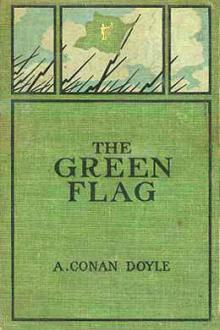That Sweet Little Old Lady, Randall Garrett and Laurence M. Janifer [books to read for self improvement txt] 📗

Book online «That Sweet Little Old Lady, Randall Garrett and Laurence M. Janifer [books to read for self improvement txt] 📗». Author Randall Garrett and Laurence M. Janifer
Malone grinned, and tried to hide the expression. Boyd was looking puzzled, then distantly angered. Nobody had ever called him illegitimate in just that way before.
But Her Majesty was absolutely right, Malone thought. The agent had always reminded him of someone, and now, at last, he knew exactly who. The hair hadn't been black, either, but red.
Boyd was, in Elizabethan costume, the deadest of dead ringers for Henry VIII.
Malone went up the steps to where Dr. Dowson was standing.
"I'm Malone," he said, checking a tendency to bow. "I called earlier today. Is this William Logan of yours ready to go? We can take him back with us in the second car."
Dr. Dowson compressed his lips and looked worried. "Come in, Mr. Malone," he said. He turned just as the second carload of FBI agents began emptying itself over the hospital grounds.
The entire procession filed into the hospital office, the two local agents bringing up the rear. Since they were not a part of Her Majesty's personal retinue, they had not been required to wear court costumes. In a way, Malone was beginning to feel sorry for them. He himself cut a nice figure in the outfit, he thought—rather like Errol Flynn in the old black-and-white print of "The Prince and the Pauper."
But there was no denying that the procession looked strange. File clerks and receptionists stopped their work to gape at the four bedizened walkers and their plainly dressed satellites. Malone needed no telepathic talent to tell what they were thinking.
"A whole roundup of nuts," they were thinking. "And those two fellows in the back must be bringing them in—along with Dr. Dowson."
Malone straightened his spine. Really, he didn't see why Elizabethan costumes had ever gone out of style. Elizabeth was back, wasn't she—either Elizabeth II, on the throne, or Elizabeth I, right behind him. Either way you looked at it—
When they were all inside the waiting room, Dr. Dowson said: "Now, Mr. Malone, just what is all this about?" He rubbed his long hands together. "I fail to see the humor of the situation."
"Humor?" Malone said.
"Doctor," Barbara Wilson began, "let me explain. You see—"
"These ridiculous costumes," Dr. Dowson said, waving a hand at them. "You may feel that poking fun at insanity is humorous, Mr. Malone, but let me tell you—"
"It wasn't like that at all," Boyd said.
"And," Dr. Dowson continued in a somewhat louder voice, "wanting to take Mr. Logan away from us. Mr. Logan is a very sick man, Mr. Malone. He should be properly cared for."
"I promise we'll take good care of him." Malone said earnestly. The Elizabethan clothes were fine outdoors, but in a heated room one had a tendency to sweat.
"I take leave to doubt that," Dr. Dowson said, eying their costumes pointedly.
"Miss Wilson here," Malone volunteered, "is a trained psychiatric nurse."
Barbara, in her gown, stepped forward. "Dr. Dowson," she said, "let me assure you that these costumes have their purpose. We—"
"Not only that," Malone said. "There are a group of trained men from St. Elizabeths Hospital in Washington who are going to take the best of care of him." He said nothing whatever about Yucca Flats, or about telepathy.
Why spread around information unnecessarily?
"But I don't understand," Dr. Dowson said. "What interest could the FBI have in an insane man?"
"That's none of your business," Malone said. He reached inside his fur-trimmed robe and, again suppressing a tendency to bow deeply, withdrew an impressive-looking legal document. "This," he said, "is a court order, instructing you to hand over to us the person of one William Logan, herein identified and described." He waved it at the doctor. "That's your William Logan," he said, "only now he's ours."
Dr. Dowson took the papers and put in some time frowning at them. Then he looked up again at Malone. "I assume that I have some discretion in this matter," he said. "And I wonder if you realize just how ill Mr. Logan is? We have his case histories here, and we have worked with him for some time."
Barbara Wilson said: "But—"
"I might say that we are beginning to understand his illness," Dr. Dowson said. "I honestly don't think it would be proper to transfer this work to another group of therapists. It might set his illness back—cause, as it were, a relapse. All our work could easily be nullified."
"Please, doctor," Barbara Wilson began.
"I'm afraid the court order's got to stand," Malone said. Privately, he felt sorry for Dr. Dowson, who was, obviously enough, a conscientious man trying to do the best he could for his patient. But—
"I'm sorry, Dr. Dowson," he said. "We'll expect you to send all of your data to the government psychiatrists—and, naturally, any concern for the patient's welfare will be our concern also. The FBI isn't anxious for its workers to get the reputation of careless men." He paused, wondering what other bone he could throw the man. "I have no doubt that the St. Elizabeths men will be happy to accept your co-operation," he said at last. "But, I'm afraid that our duty is clear. William Logan goes with us."
Dr. Dowson looked at them sourly. "Does he have to get dressed up like a masquerade, too?" Before Malone could answer, the psychiatrist added: "Anyhow, I don't even know you're FBI men. After all, why should I comply with orders from a group of men, dressed insanely, whom I don't even know?"
Malone didn't say anything. He just got up and walked to a phone on a small table, near the wall. Next to it was a door, and Malone wondered uncomfortably what was behind it. Maybe Dr. Dowson had a small arsenal there, to protect his patients and prevent people from pirating them.
He looked back at the set and dialed Burris' private number in Washington. When the director's face appeared on the screen, Malone said: "Mr. Burris, will you please identify me to Dr. Dowson?" He looked over at Dowson. "You recognize Mr. Andrew J. Burris, I suppose?" he said.
Dowson nodded. His grim face showed a faint shock. He walked to the phone, and Malone stepped back to let him talk with Burris.
"My name is Dowson," he said. "I'm psychiatric director here at Desert Edge Sanitarium. And your men—"
"My men have orders to take a William Logan from your care," Burris said.
"That's right," Dowson said. "But—"
While they were talking, Queen Elizabeth I sidled quietly up to Malone and tapped him on the shoulder.
"Sir Kenneth," she whispered in the faintest of voices, "I know where your telepathic spy is. And I know who he is."
"Who?" Malone said. "What? Why? Where?" He blinked and whirled. It couldn't be true. They couldn't solve the case so easily.
But the Queen's face was full of a majestic assurance. "He's right there," she said, and she pointed.
Malone followed her finger.
It was aimed directly at the glowing image of Andrew J. Burris, Director of the FBI.
 "Not legally responsible, of course...."
V
"Not legally responsible, of course...."
V
alone opened his mouth, but nothing came out. Not even air.
He wasn't breathing.
He stared at Burris for a long moment, then took a breath and looked again at Her Majesty. "The spy?" he whispered.
"That's right," she said.
"But that's—" He had to fight for control. "That's the head of the FBI," he managed to say. "Do you mean to say he's a spy?"
Burris was saying: "... I'm afraid this is a matter of importance, Dr. Dowson. We cannot tolerate delay. You have the court order. Obey it."
"Very well, Mr. Burris," Dowson said with an obvious lack of grace. "I'll release him to Mr. Malone immediately, since you insist."
Malone stared, fascinated. Then he turned back to the little old lady. "Do you mean to tell me," he said, "that Andrew J. Burris is a telepathic spy?"
"Oh, dear me," Her Majesty said, obviously aghast. "My goodness gracious. Is that Mr. Burris on the screen?"
"It is," Malone assured her. A look out of the corner of his eye told him that neither Burris, in Washington, nor Dowson or any others in the room, had heard any of the conversation. Malone lowered his whisper some more, just in case. "That's the head of the FBI," he said.
"Well, then," Her Majesty said, "Mr. Burris couldn't possibly be a spy, then, could he? Not if he's the head of the FBI. Of course not. Mr. Burris simply isn't a spy. He isn't the type. Forget all about Mr. Burris."
"I can't," Malone said at random. "I work for him." He closed his eyes. The room, he had discovered, was spinning slightly. "Now," he said, "you're sure he's not a spy?"
"Certainly I'm sure," she said, with her most regal tones. "Do you doubt the word of your sovereign?"
"Not exactly," Malone said. Truthfully, he wasn't at all sure. Not at all. But why tell that to the Queen?
"Shame on you," she said. "You shouldn't even think such things. After all, I am the Queen, aren't I?" But there was a sweet, gentle smile on her face when she spoke; she did not seem to be really irritated.
"Sure you are," Malone said. "But—"
"Malone!" It was Burris' voice, from the phone. Malone spun around. "Take Mr. Logan," Burris said, "and get going. There's been enough delay as it is."
"Yes, sir," Malone said. "Right away, sir. Anything else?"
"That's all," Burris said. "Good night." The screen blanked.
There was a little silence.
"All right, doctor," Boyd said. He looked every inch a king, and Malone knew exactly what king. "Bring him out."
Dr. Dowson heaved a great sigh. "Very well," he said heavily. "But I want it known that I resent this high-handed treatment, and I shall write a letter complaining of it." He pressed a button on an instrument panel in his desk. "Bring Mr. Logan in," he said.
Malone wasn't in the least worried about the letter. Burris, he knew, would take care of anything like that. And, besides, he had other things to think about.
The door to the next room had opened almost immediately, and two husky, white-clad men were bringing in a strait-jacketed figure whose arms were wrapped against his chest, while the jacket's extra-long sleeves were tied behind his back. He walked where the attendants led him, but his eyes weren't looking at anything in the room. They stared at something far away and invisible, an impalpable shifting nothingness somewhere in the infinite distances beyond the world.
For the first time, Malone felt the chill of panic. Here, he thought, was insanity of a very real and frightening kind. Queen Elizabeth Thompson was one thing—and she was almost funny, and likable, after all. But William Logan was something else, and something that sent a wave of cold shivering into the room.
What made it worse was that Logan wasn't a man, but a boy, barely nineteen. Malone had known that, of course—but seeing it was something different. The lanky, awkward figure wrapped in a hospital strait jacket was horrible, and the smooth, unconcerned face was, somehow, worse. There was no threat in that face, no terror or anger or fear. It was merely—a blank.
It was not a human face. Its complete lack of emotion or expression could have belonged to a sleeping child of ten—or to a member of a different race. Malone looked at the boy, and looked away.
Was it possible that Logan knew what he was thinking?
Answer me, he thought, directly at the still boy.
There was no reply, none at all. Malone forced himself to look away. But the air in the room seemed to have become much colder.
The attendants stood on either side of him, waiting. For one long second no one moved, and then Dr. Dowson reached into his desk drawer and produced a sheaf of papers.
"If you'll sign these for the government," he said, "you may have Mr. Logan. There seems little else that I can do, Mr. Malone—in spite of my earnest pleas—"
"I'm sorry," Malone said. After all, he needed Logan, didn't he? After a look at the boy, he wasn't sure any more—but the Queen had said she wanted him, and the Queen's word was law. Or what passed for law, anyhow, at least for the moment.
Malone took the papers and looked them over. There was nothing special about them; they were merely standard release forms, absolving the staff and management of Desert Edge Sanitarium from every conceivable responsibility under any conceivable circumstances, as far as William Logan was concerned. Dr. Dowson gave Malone a look that said: "Very well, Mr. Malone; I will play Pilate and wash my hands of the matter—but you needn't think I like it." It was a lot for one look to say, but Dr. Dowson's dark and sunken eyes got the message across with no loss in transmission. As a matter of fact, there seemed to be more coming—a much less printable message was apparently on the way through those glittering, sad and angry eyes.
Malone avoided them nervously, and went over the papers again instead. At last he signed them and handed them back. "Thanks for your co-operation, Dr. Dowson," he said briskly, feeling ten kinds of a traitor.
"Not at all," Dowson said bitterly. "Mr. Logan is now in your custody. I must trust you to take good care of him."
"The best care we can," Malone said. It didn't seem sufficient. He added: "The best possible care, doctor," and tried to look dependable and trustworthy, like a Boy Scout. He was aware that the effort failed miserably.
At his signal, the two plainclothes FBI men took over from the attendants. They marched Logan out to their car, and Malone led the procession back to Boyd's automobile, a procession that consisted—in order—of Sir Kenneth Malone, prospective Duke of Columbia, Queen Elizabeth





Comments (0)